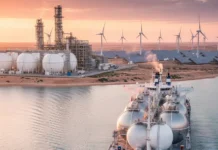A new study looking at the usage of PV-powered cold ironing in the largest port in East Africa has concluded that small-scale solar plants could be crucial to reducing – or ending – greenhouse gas emissions from vessels docked in major coastal industrial sites throughout the world.
In Kenya’s Port of Mombasa, research by the energy and marine consultant ABL discovered two brownfield locations where 5–10 MW solar arrays may produce enough onshore power to decarbonize tankers and freighters operating fossil fuel-fed generators while anchored.
Aimee Besant, energy storage lead at ABL, observed that using cold ironing can secure a significant reduction in the local burning of heavy fuel oils, leading to an improvement in local air quality.
This project illustrates the scope of the opportunity for other ports across the world to investigate the installation of shore power generated from their local renewable energy resource, along with the additional potential when combined with energy storage technologies like lithium batteries or hydrogen.
Besant asserted a study from 2021 that showed using electrical power from the shore would lead to significant reductions in the 25% of emissions produced by vessels in port. She further added that the ABL calculus showed the possibility of generating electricity from 100% clean local solar resources, creating a wholly green contribution to the shore power system.
In order to determine whether a combination of PV-generated and grid-supplied shore power would be more affordable than conventional onboard generators, the project was commissioned in response to the Kenyan Ports Authority’s proposal to implement the Green Ports Policy, which calls for all vessels to switch off their onboard generators and operate from shore power when at anchor.











































